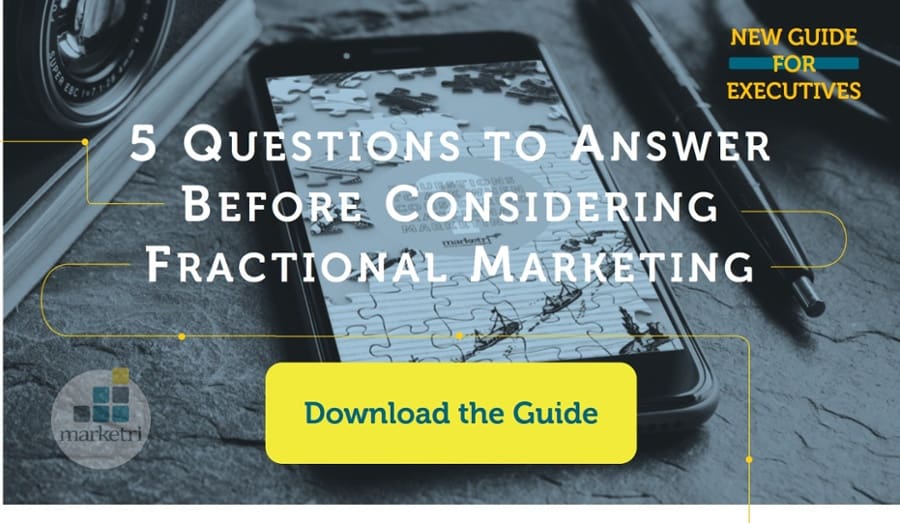Is a Fractional CMO Paid More – Or Less – Than a Traditional In-House CMO?
Small and mid-size B2B businesses face a dilemma when they are setting up their marketing operations: how much to budget – and what to spend it on.
In fact, the list of potential marketing expenditures today is long and growing. New emerging mobile¸ virtual, and social platforms continue to attract the time and attention of consumers and business buyers. The use of video, VR, AR, and other advancing technologies in campaigns is on the rise. And marketplace data has never been more readily accessible – but data alone is not of much use without the sophisticated AI, machine learning, and analytics solutions needed to distill it into actionable insights.
While each of these technological assets holds promise to bring success to marketing organizations, for many companies, the reality is this:
- budgets must be kept in check
- decisions on where and how to spend can be challenging to make
- expenditures must deliver growth, profits, and measurable ROI
Consider also that, for most businesses today, their largest marketing expense is personnel – even as they continue to leverage new emerging technologies. To move business objectives forward and grow market share, businesses have to implement sound, holistic marketing strategies that take full advantage of their digital investments. Accordingly, they need an experienced chief marketing officer (CMO) to lead the way.
Bringing a CMO On Board
For many organizations today, hiring a full-time CMO is cost prohibitive. Top CMOs nationwide earn upwards of $350,000 annually, or more in highly competitive industries like technology and financial services.
While many companies opt to promote a lower-level in-house marketing professional into the CMO role to save on overhead costs, this individual may not have the qualifications or experience required to navigate the complexities of the role. Ultimately, the right CMO candidate should bring to the position:
- broad-based expertise in both your own sector and others
- exceptional strategic skills
- proven experience in building a successful marketing organization
- professional ties to senior-level contractors and external organizations that your company can tap to implement your strategic plan
Instead of hiring or promoting an in-house employee, a better strategy for many small and mid-size businesses is to engage a highly experienced fractional CMO. Through a fractional marketing model, organizations can deploy just the right talent mix in the specific skillsets needed – from the CMO role on down to supporting writers, graphic designers, social media managers, PR practitioners, data analysts, web developers, and others – to both set a sound, data-driven strategy in motion and execute well on that strategy. Central to making a fractional marketing model work is the fractional CMO.
Why Choose a Fractional CMO
There are many reasons for small and mid-size businesses to consider hiring a fractional CMO. For one, it can allow them to employ a C-suite-level leader at a lower cost than they would otherwise pay to retain this individual full time.
Plus, a smaller company may only need the guidance and involvement of a CMO on a part-time basis. At today’s going rate of around $225 per hour, for example, a company could retain a fractional CMO for 40 hours per month for $108,000 annually – considerably less than what they would pay a full-time, in-house CMO.
Consider also that early-stage companies can benefit tremendously from the experience a top-level CMO brings to their marketing organization. This is because they are building a business from scratch and can’t afford to get it wrong. Time is also of the essence for start-up businesses because they need to scale quickly and prove that there is demand for their offerings to obtain the next round of funding and sustain cash flow.
For established organizations, the business case is just as compelling. If your firm is in the midst of implementing a marketing transformation strategy, for example, an experienced CMO strategist can prove invaluable in helping you build out the right organization, solidify best practices, and accelerate your momentum through every phase of your growth journey.
However, not all fractional CMOs are alike. In filling this important leadership position, your organization should require these and other credentials:
- a proven track record of developing effective marketing strategies, positioning plans, and brand narratives
- experience building and leading teams of both in-house and contracted professionals
- expertise in shaping, implementing and integrating marketing and sales technologies
- experience in establishing marketing playbooks to ensure execution is done with quality and efficiency
- the ability to set up robust dashboards that measure success and offer key insights
In today’s digital-first economy, the opportunity costs incurred by not scaling the marketing function fast enough are high. And if you have built an in-house marketing organization that is not performing optimally on a tactical level, that will impact your bottom line as well.
So, establish a reasonable budget for the CMO position – and consider bringing in a fractional CMO not just for the cost efficiencies involved, but also for the depth of expertise these individuals often bring to a company’s growth strategy.
While you receive economies of scale in sharing this strategic resource across other clients the fractional CMO serves – you may just find that the talent you have brought on board is delivering so much value to your business that you wish to expand his or her role. More importantly, you may have discovered what many other organizations are finding today: that the right marketing model to drive results and outperform the competition is fractional.
See how Marketri’s fractional marketing experts can help you accelerate your growth strategy. Schedule a free consultation today.






